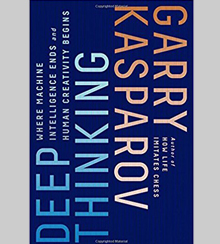strategy+business, July 19, 2017
by Theodore Kinni
 In June 1985, Garry Kasparov, the highest-ranked chess player in the world, simultaneously played 32 games against 32 computers. He swept the event, winning every game. Twelve years later, in May 1997, Kasparov played a high-stakes, head-to-hard-drive, six-game match against a single computer: IBM’s Deep Blue. The result? The supercomputer beat the reigning chess champ in regulation play. Artificial intelligence had hit the big time.
In June 1985, Garry Kasparov, the highest-ranked chess player in the world, simultaneously played 32 games against 32 computers. He swept the event, winning every game. Twelve years later, in May 1997, Kasparov played a high-stakes, head-to-hard-drive, six-game match against a single computer: IBM’s Deep Blue. The result? The supercomputer beat the reigning chess champ in regulation play. Artificial intelligence had hit the big time.It’s taken Kasparov a long time to process his historic battle against Deep Blue. “I’m a sore loser,” he frankly admits in Deep Thinking, which is a meditation on both his personal history and the future of work. A full 20 years later, that characteristic is evident in Kasparov’s description and analysis of the match — and his detailed suspicions about spying and “human intervention” by IBM.
Kasparov clearly didn’t expect Big Blue, led in those days by Louis Gerstner Jr., to play to win. The company invested an estimated US$20 million in developing and promoting Deep Blue, and the win, Kasparov argues, boosted IBM’s stock by $11.4 billion in just over a week — to say nothing of the value that accrued to the brand. Nevertheless, Kasparov appears surprised that IBM treated the match as anything other than a collegial experiment in computer science (even though he had negotiated a guaranteed minimum payday of $400,000 in case of a loss; the Deep Blue development team received $700,000).
Unless you are a serious chess player, however, Kasparov’s account of the match isn’t the best reason to read Deep Thinking. Read the rest here.















No comments:
Post a Comment